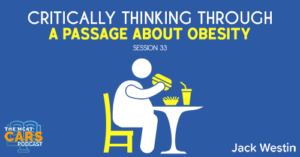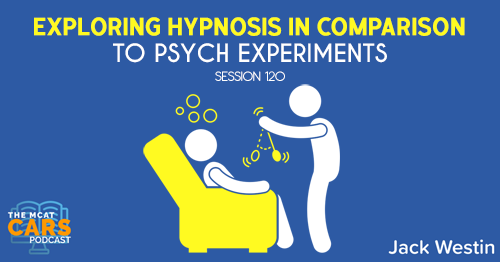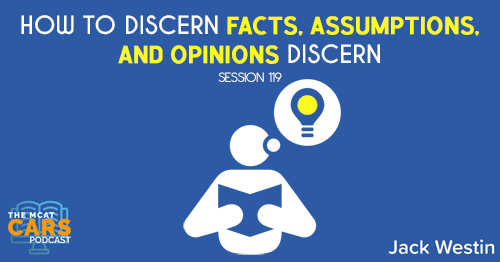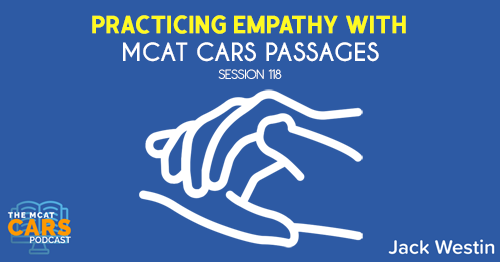Apple Podcasts | Google Podcasts

Session 33
Today, we talk about some sweets and obesity. This is a pretty straightforward passage. It talks something we’re all aware of.
As always, I’m joined by Jack Westin, the premiere MCAT CARS tutor. The course has just ended as of this recording.
Link to article:
Removing sweets and crisps from supermarket checkouts could dramatically cut the amount of unhealthy snacks bought to eat on the go, say researchers.
Under pressure to act because of rising childhood obesity, some supermarkets have moved snacks away from the till, where people queuing – often with children – are tempted to put them in the shopping basket as they wait their turn.
Research shows the positioning of products at the checkout or on the end of aisles increases their sales. The findings suggest that many families who stop adding sweets and crisps at the counter appear not to buy them at all.
The government-funded study, published in the journal Plos Medicine,found that 76% fewer annual purchases of sugary confectionery and crisps were bought and eaten on the go from supermarkets that do not stock them at checkouts than at those that do.
The study used commercially held data from 7,500 shoppers who recorded food bought and eaten on the go during 2016-17 from supermarkets with and without checkout food policies. On the go purchases are often impulsive and can be the result of children pestering their parents.
The researchers, from Cambridge, Stirling and Newcastle universities, also looked at how purchases of less healthy, common checkout foods that were brought home – rather than eaten on the go – changed after the implementation of checkout policies. They used data from more than 30,000 UK households from 12 months before to 12 months after implementation.
They found that removing the unhealthy snacks from the checkout was associated with an immediate 17% reduction in purchases. After a year, shoppers were still purchasing 15% fewer of the items compared with when no policy was in place.
[02:57] Paragraph 1, Sentence 1
Removing sweets and crisps from supermarket checkouts could dramatically cut the amount of unhealthy snacks bought to eat on the go, say researchers.
Jack says:
This is a Guardian article, which is a UK article. So when they say crisps, it means chips. The author is paraphrasing the researcher on cutting down unhealthy snacks. So if we removed them from the checkout line then people won’t buy them.
This is an argument. Maybe this has nothing to do with the checkout line. Maybe they’d still buy them even if they removed them from the checkout line.
What would you have done if you find sweets on the checkout line? You want to actually interact with what you’re reading. You want to be aware of what’s going on. Question whether or not you agree or disagree with whatever is happening. That’s when you know you’re reading properly.
'Instead of being a passive reader, you want to be an active reader.'Click To TweetAlso, take note that researchers were saying it versus the author. So be careful. Maybe the author will go against this. We don’t know as of yet. Usually, if they bring up someone’s point of view, the author probably agrees with it. But that’s not always the case as they may challenge that later on.
The point that is usually discussed more often or the one supported by more evidence is what the author would usually care more about.
[06:32] Paragraph 2, Sentence 1
Under pressure to act because of rising childhood obesity, some supermarkets have moved snacks away from the till, where people queuing – often with children – are tempted to put them in the shopping basket as they wait their turn.
Jack says:
They’re thinking of moving the snacks because of the childhood obesity. It brings up this picture of people queueing and kids begging their parents to get some sweets. So they bring up both claims in one sentence.
[07:45] Paragraph 3, Sentence 1
Research shows the positioning of products at the checkout or on the end of aisles increases their sales.
Jack says:
Again, it talks about research and how the location of the food can affect people’s tendency to buy or not.
[08:00] Paragraph 3, Sentence 2
The findings suggest that many families who stop adding sweets and crisps at the counter appear not to buy them at all.
Jack says:
The families are not buying them if they’re not there. And if they are there, they’re going to buy them.
[08:27] Paragraph 4, Sentence 1
The government-funded study, published in the journal Plos Medicine,found that 76% fewer annual purchases of sugary confectionery and crisps were bought and eaten on the go from supermarkets that do not stock them at checkouts than at those that do.
Jack says:
It’s showing the impact of moving the chips and sweets. This is evidence to support the author’s point of view. This may not be true.
You should not take this as a fact just because one research study showed this. This is how the author is trying to convince you that we shouldn’t have sugars and chips at our checkout aisles. They will bring up points to strengthen their claim but you should never take it as a fact.
Remember, this is just the author bringing up this evidence to present their point of view.
'Be prepared for anything. Don't fall in love with what you're reading because the author could change any minute, any second.'Click To TweetBe aware of what you’re reading and what the author is saying. Be willing to look at this in a new way and comprehend this in a different way depending on how the author presents. it.
It takes a very unique kind of mindset to do well on these passages. You have to read while paying attention. But just because you’re paying attention doesn’t mean that you agree with the author.
[11:58] Paragraph 5, Sentence 1
The study used commercially held data from 7,500 shoppers who recorded food bought and eaten on the go during 2016-17 from supermarkets with and without checkout food policies.
Jack says:
It’s showing us the impact of the study as they’re trying to make the study more valid with 7,500 shoppers.
[12:27] Paragraph 5, Sentence 2
On the go purchases are often impulsive and can be the result of children pestering their parents.
Jack says:
They’re showing us where the purchases are coming from. Why are they purchasing? They’re purchasing as an impulse because kids are bothering them about it.
The MCAT may ask questions about the way the author presents this information. It may not be directly in the passage. But you need to picture out kids bothering their parents and they’re impulsively buying something.
[14:08] Paragraph 6, Sentence 1
The researchers, from Cambridge, Stirling and Newcastle universities, also looked at how purchases of less healthy, common checkout foods that were brought home – rather than eaten on the go – changed after the implementation of checkout policies.
Jack says:
They’re setting us up with a different data – another researcher, another experiment.
[14:36] Paragraph 6, Sentence 2
They used data from more than 30,000 UK households from 12 months before to 12 months after implementation.
Jack says:
The author is presenting the validity of the study here with 30,000 UK households.
[14:55] Paragraph 7, Sentence 1
They found that removing the unhealthy snacks from the checkout was associated with an immediate 17% reduction in purchases.
Jack says:
They’re showing us the power of that policy.
[15:09] Paragraph 7, Sentence 2
After a year, shoppers were still purchasing 15% fewer of the items compared with when no policy was in place.
Jack says:
This is showing us the lasting effects of these policies where unhealthy practices are being decreased.
A possible question here is what explains the percentage difference between the first study and the second study. The first says said 76% fewer and the second study says 15% fewer. You have to be aware of what they said to be able to pick the right answer.
[16:40] Highlighting Studies
Jack doesn’t recommend highlighting these studies. Otherwise, you will be highlighting everything. If you make this mistake once and you learn from it, you’re less likely to make that mistake.
What Jack teaches students in the course is to first focus on eliminating the bad answers. You don’t even need to know the difference if you can use other test-taking strategies to try to get to the right answer.
'Being aware of what's happening is very important and that can only be developed through practice and patience and just reading a lot.'Click To TweetLook at the big point. Then understand the context. These things will make a difference when you read.
[18:18] Jack Westin
At Jack Westin, they focus on critical thinking. They seek to improve critical thinking in a world where everyone is just focusing on memorizing or looking at things that are not in a problem-solving oriented way.
The MCAT is a reading test and it includes a lot of critical thinking throughout the entire test.
Jack Westin has created a course focused entirely on CARS and strategically approaching CARS efficiently in a timely manner and getting all the questions right. They teach students how to answer questions properly and how to read properly.
'CARS is purely critical thinking.'Click To TweetThis podcast is more focused on reading comprehension, just getting better overall. But the course focuses on trends – certain things to look at using those points you find to answer the question.
If this is something you’re interested in, check out Jack Westin. It’s a very self-paced oriented course. It focuses on everything and all the problems you can probably see on the test. They teach students step-by-step.
If you follow certain formulas and a certain way you look at things, you’re going to be seeing things in a different way. And you’re going to start thinking more critically about what you’re reading. You can also use this for the other sections of the exam.
This is a program and a commitment. You really have to focus on the techniques they’re describing in the course. It takes a lot of discipline. And the students who put in the work are very satisfied with their results.
Get live sessions every week where you can access Jack Westin and his team. They help you go through homework passages in live-oriented ways. Everything they do is based on the AAMC materials.
Links:
Text CARSCOUPON to 44222.
Link to article:
SEARCH SITE
SEARCH SITE
LISTEN FOR FREE











